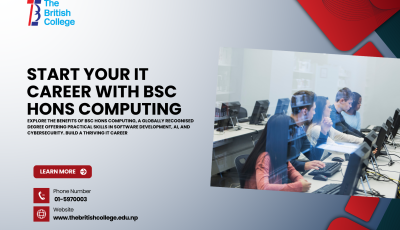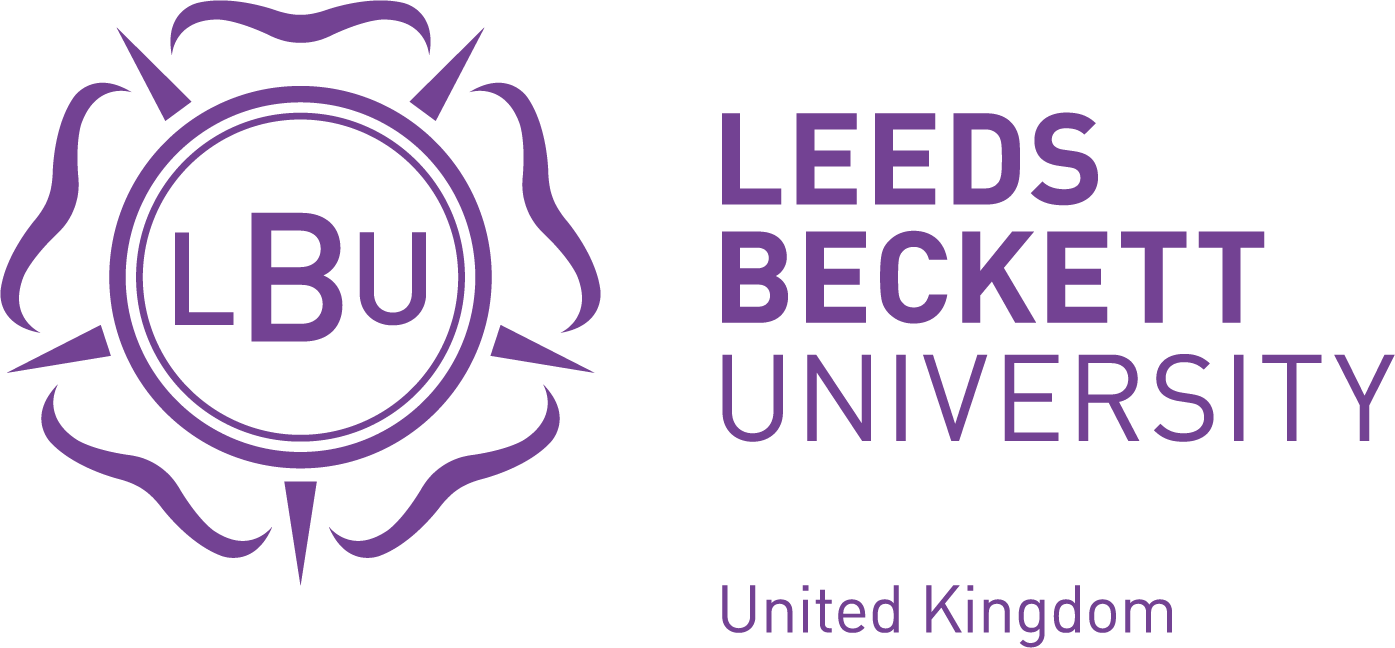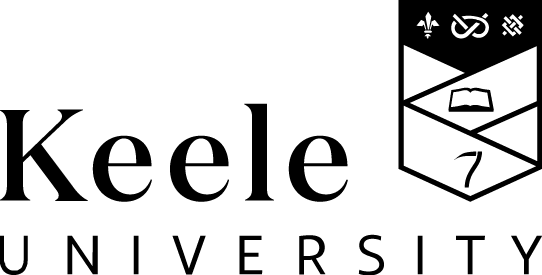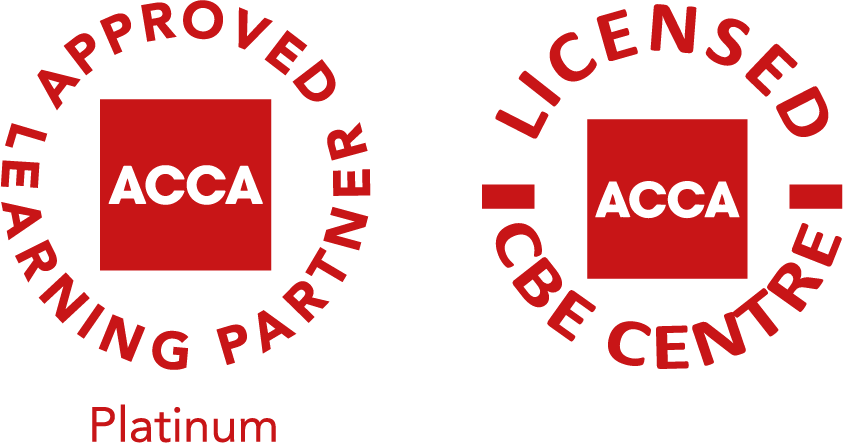BSc Honours Computing - Your Gateway to a Better Tech-Driven Future
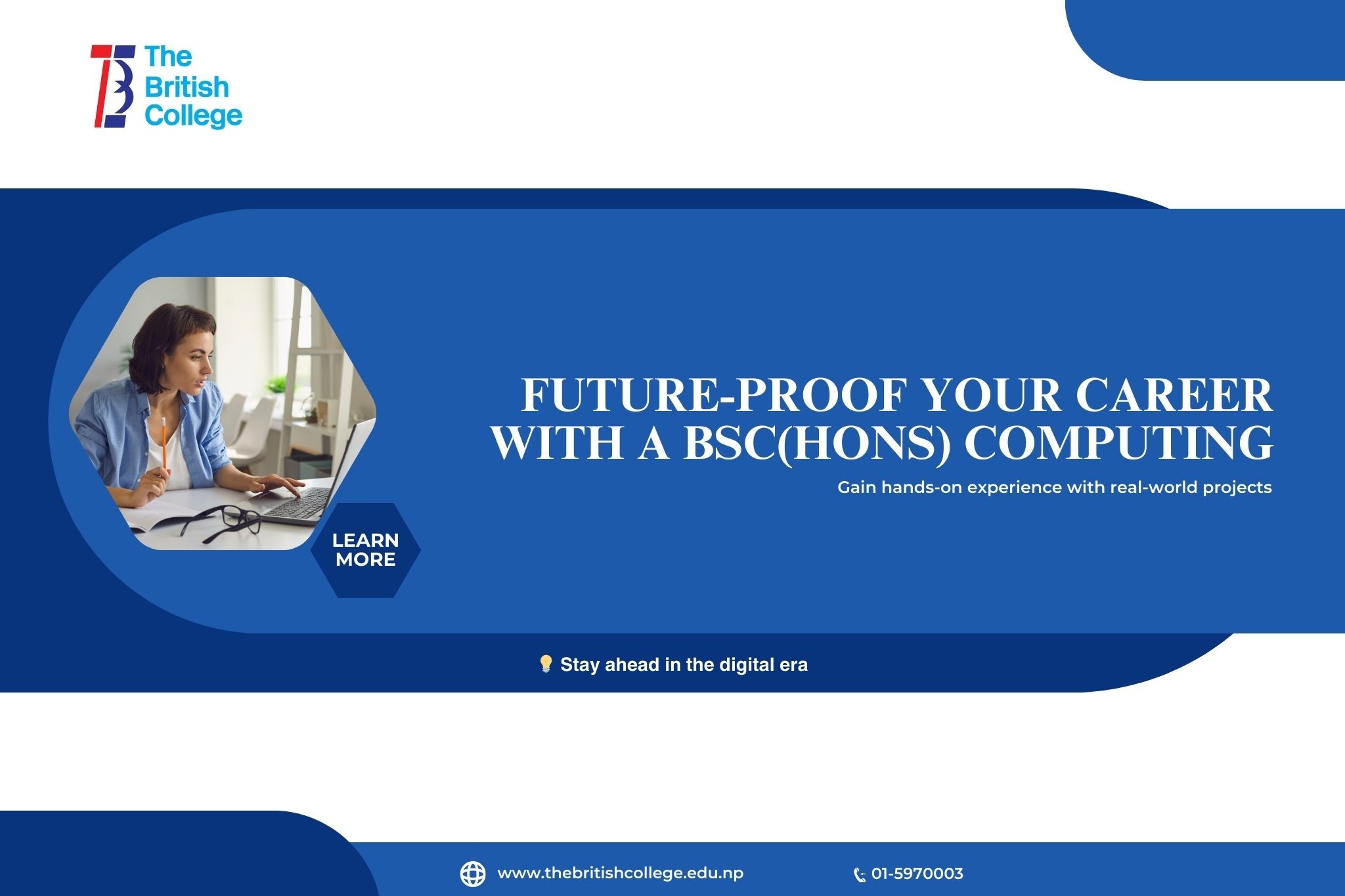
The demand for skilled computing and IT professionals is skyrocketing in today's digital age. If you're considering a career in this field, then a BSc honours computing and IT degree could be the perfect programme for you to enrol into. However, you may be unaware of all of the details regarding the program and if this course has everything that will fulfil your requirements and aspirations. This blog will act as a guide and help you explore everything you need to know.
What is BSc Honours Computing and IT?
In today's digital world, information technology and computing are both at the heart of innovation, automation and problem-solving. A BSc Honours Computing and IT is a specialised undergraduate degree that helps students become well-versed with the knowledge and skills required for developing software, managing IT infrastructure, analysing data and building innovative technology solutions that solve real-world problems.
Such a degree is designed for individuals who are passionate about technology, eager to solve complex problems and build a career in fields that include software development, cyber security, data science and artificial intelligence.
Overview of the BSc Hons Computing and Information Systems
A BSc Honours Computing programme typically takes 3 to 4 years (if the foundational year is included) and combines theoretical knowledge with hands-on experience to provide balanced learning for the students. Enrolled students explore topics such as fundamental computing principles, software development techniques, data management and relevant technologies that include artificial intelligence and cloud computing.
Core Subjects Covered
- Programming and Software Development: Students are involved in the learning of programming languages such as Python, Java and C++, through various course works and projects that are assigned to them.
- Cyber security and Networking: Students gain a thorough understanding of secure systems and networks and the best practices and techniques for securing them against the numerous cyber threats that exist.
- Data Science and AI: Students get the opportunity to work with machine learning technologies and learn to develop AI models. They also learn to analyse data trends and gain important insights from data.
- Web and Mobile App Development: Students gain experience in designing and developing applications for web and mobile. Through coursework and projects, students will be able to develop web apps and mobile apps that follow the best practices.
- Cloud Computing and IT Infrastructure: Good expertise in managing cloud-based systems using popular tools is built throughout the course.
- Database Management: Students learn to store, retrieve and optimise the stored data efficiently. This module is extremely crucial and is taught as a priority.
This program includes real-world projects, internships and industry collaboration that ensure that the students graduate with the necessary practical experience and problem-solving skills needed for the job market.
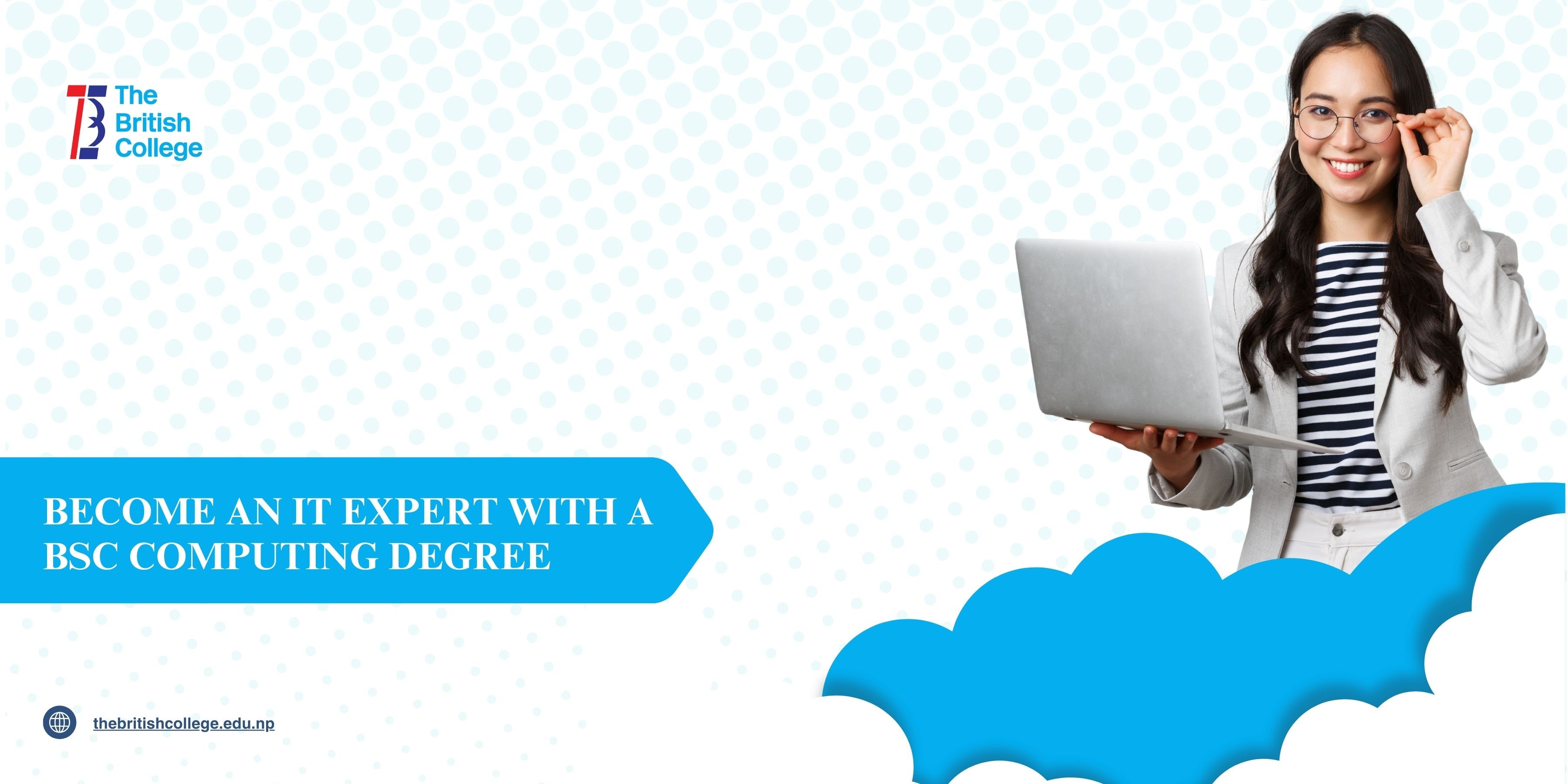
Key Skills You’ll Gain
Pursuing a BSc honours computing degree helps develop a student's technical expertise and professional competencies, turning them into valuable assets that can thrive in the tech industry.
Technical Skills
- Programming & Software Engineering – Learn to develop efficient and secure applications..
- Data Analysis & Machine Learning – Work with large datasets and predictive models.
- Cybersecurity Awareness – Identify vulnerabilities and implement security measures.
- Networking & Cloud Computing – Manage and optimise cloud-based systems.
- Web & Mobile Development – Build user-friendly applications for different devices.
Professional & Soft Skills
- Problem-Solving & Critical Thinking – Approach complex challenges with logical solutions.
- Project Management – Plan, execute, and deliver projects effectively.
- Communication & Teamwork – Collaborate with professionals from various fields.
- Adaptability & Continuous Learning – Stay updated with evolving technologies.
Why Choose BSc Hons Computing and IT?
As technology is driving every aspect of modern life, a BSc Honours Computing and IT degree has become one of the most sought-after degrees. This degree opens doors to numerous opportunities in the tech industry, whether you're passionate about software development, cyber security, artificial intelligence or even data science.
With the rapid advancement of technology, skilled computing professionals are also in high demand across numerous industries such as finance, healthcare, entertainment and cyber security. If you are looking for a dynamic and innovative career that also has a promising future, then this degree would be an excellent choice.
Career Opportunities
Graduates having a BSc Hons in Computing and IT have a multitude of career paths lying ahead of them. The versatility of the degree offers you the opportunities to work in numerous different fields such as:
- Software Development – Graduates can become a front-end, back-end, or full-stack developer.
- Cyber security – Protect businesses from cyber threats and data breaches by becoming security analysts.
- Data Science & AI – Analyse big data and develop machine learning models by becoming a data analyst.
- IT Consulting & Project Management – Help companies optimise their technology infrastructure by becoming a consultant or project manager.
- Cloud Computing & DevOps – Work with cloud-based systems and automation by becoming a DevOps engineer.
- Game Development – Create interactive and immersive gaming experiences by taking the role of a game developer.
Industry Demand
The demand for computing and IT professionals is growing at a rapid rate. With companies across all industries embracing digital transformation and AI-driven solutions together with automation, the need for skilled graduates has been increasing faster than ever.
Key Industry Trends Driving Demand:
- Artificial Intelligence & Machine Learning – As businesses have been leveraging AI for automation and decision-making purposes, there is a lot of demand for IT graduates with computing and AI degrees.
- Cybersecurity & Data Privacy – Due to the rising cyber threats, cyber security professionals are in high demand to solve the security problems of numerous organisations and businesses.
- Cloud Computing & IT Infrastructure – With companies moving towards cloud-based solutions, there are a lot of opportunities in this field for IT professionals.
- Software Development & Mobile Applications – The demand for innovative applications continues to grow as the world undergoes a digital transformation.
- Big Data & Analytics – Organisations are in constant need of data professionals for analysing and interpreting large datasets.
According to industry reports, the tech sector's continuous expansion does not seem to be stopping any time soon. For computing graduates, high salaries, job security and career progression are offered due to the demand of the market.

BSc Computing and Information Systems vs. BSc Hons Computing and Information Technology
It is crucial to understand the differences between BSc Computing and Information Systems and BSc Honours Computing and IT when choosing a computing degree. While both the programs are similar and have a primary focus on core computing principles, they have distinct areas of specialisation, career paths and learning outcomes. Understanding such differences can help in deciding the degree that suits you the best and aligns with your career goals.
Curriculum Comparison
The BSc Computing and Information Systems program is more focused towards the application of IT in business environments. The program covers various topics such as Information Systems management, enterprise systems as well as business analytics. Programming components are included whereas the main emphasis is on databases, system integration and IT support rather than focusing on software development. Such a degree is ideal for students who want to work in IT management, data analytics or business consulting.
However, the BSc Honours Computing and Information Technology program has a stronger technical focus. It deep dives into software development, artificial intelligence, cyber security, networking and cloud computing. Enrolled students will be taught advanced programming, algorithms, and machine learning techniques that help prepare them for careers in software engineering, cyber security, IT infrastructure and AI. This degree would be suitable for students who enjoy hands-on problem-solving and work with the latest cutting-edge technologies.
Career Path Differences
The career opportunities for graduates of each degree can vary based on the focus of the curriculum of the program. With a BSc Computing and Information Systems degree, various roles such as IT manager, business analyst, database administrator or systems consultant can be pursued. Such roles require a mix of technical and business knowledge, that is provided by the degree and is a great choice for individuals wanting to work at the intersection of technology and business strategy.
However, a BSc Honours Computing and IT degree helps prepare graduates for a technical and development-focused career. The roles that graduates can pursue can include software developer, AI engineer, cyber security analyst, cloud computing specialist and DevOps engineer. The demand for professionals in such fields has been on the rise, with companies looking for numerous experts in machine learning, data science, ethical hacking and cloud security for their businesses.
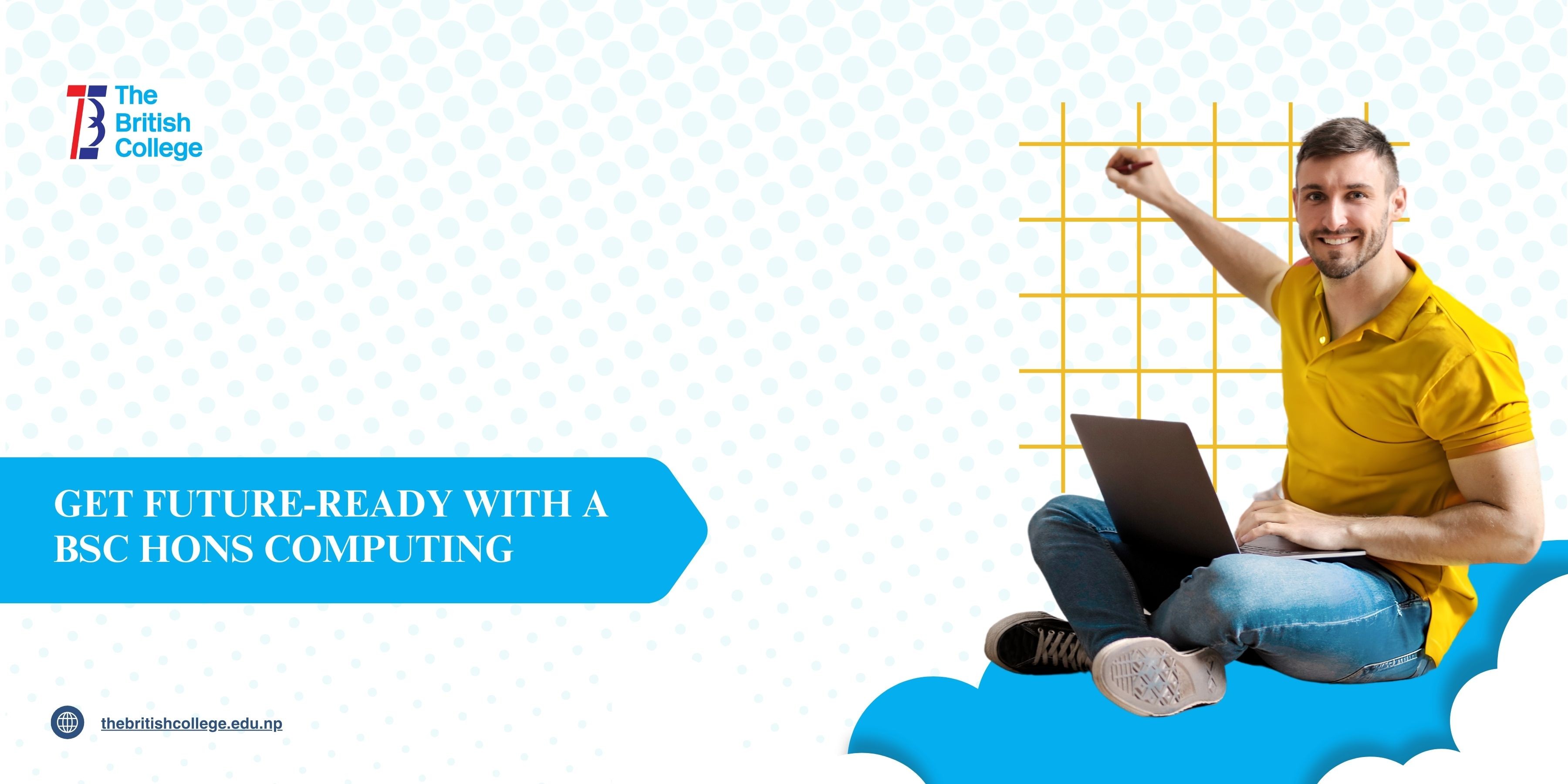
What Can You Do After BSc Hons Computing and Information Systems?
A BSc Honours Computing and IT degree opens up a world of opportunities, whether you want to step into the professional world or continue your studies. With technology playing a vital role in every industry, your skills will be highly valued across various sectors, from software development and cyber security to artificial intelligence and cloud computing.
Job Roles
1. Software and Web Development
- Software Engineer – A software engineer undertakes the responsibility of designing, developing and testing various applications.
- Web Developer – A web developer focuses mainly on building and maintaining websites using various front-end and back-end technologies.
- Mobile App Developer - Creating applications for iOS and Android platforms is the main responsibility of a mobile app developer.
2. Data Science and AI
- Data Analyst – Interpret data to help businesses make informed decisions by becoming a data analyst.
- Machine Learning Engineer – ML engineers develop AI-driven solutions and algorithms.
- Business Intelligence Analyst – Using data insights to enhance company performance is the responsibility of a BI analyst.
3. Cyber security and IT Infrastructure
- Cyber security Analyst – Protect systems and networks from cyber threats by becoming a cyber security analyst.
- Cloud Engineer – Cloud Engineers manage and optimise cloud-based services and platforms.
- Network Administrator – A network administrator oversees and maintains an organisation’s IT networks.
4. Emerging Technologies and Specialised Roles
- DevOps Engineer – Automate and streamline software development and various IT operations by becoming a DevOps Engineer.
- Blockchain Developer – Work on decentralised applications and digital security by taking the role of a blockchain developer.
- Game Developer – Game Developers undertake the tasks of designing and developing engaging video games.
Further Studies
Pursuing a postgraduate degree can be a great option for someone who wants to specialise further or increase their career prospects. Some common paths that graduate students may undertake are:
1. Master’s Degrees
- MSc in Computer Science – You can deepen your technical expertise in areas such as AI and software engineering by pursuing an MSc in Computer Science.
- MSc in Cyber security – If you want to focus on digital security, ethical hacking, and data protection, then an MSc in cyber security would be perfect for you.
- MSc in Data Science and AI – MSc in Data Science and AI specialises in data analytics, machine learning, and big data.
2. Professional Certifications
Some short-term certifications can also boost your credentials and make you stand out in the job market from other competitors while also expanding your skill set. Some certifications you can pursue are:
- AWS Certified Solutions Architect
- Certified Ethical Hacker (CEH)
- Google Data Analytics Certificate
- Microsoft Azure Fundamentals
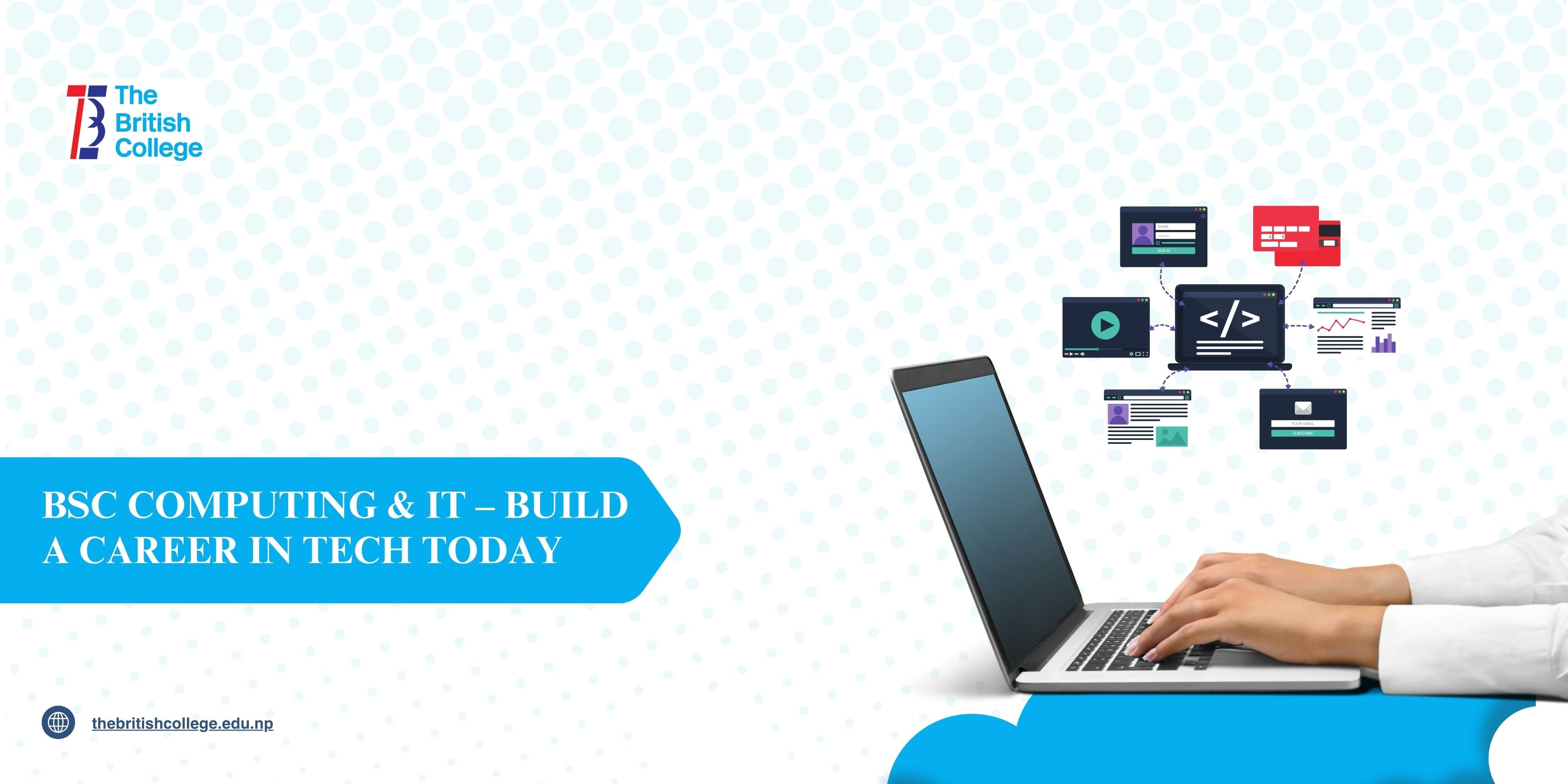
How to Excel in BSc Hons Computing and IT
To excel in a BSc Honours Computing and IT program, a student will need to contribute more than just attending lectures and submitting assignments. To stand out, students will need to develop strong technical skills, stay updated with the latest industry trends and gain real-world experience. Some tips on how you can make the most of your degree and launch yourself for a successful career are:
Study Tips
- Understand the Fundamentals – Students need to build a solid foundation in programming, data structures, algorithms, and databases before moving ahead to some of the advanced topics.
- Practice Coding Daily – Sharpen your programming and problem-solving skills on a regular basis with the help of platforms such as LeetCode, HackerRank and CodeWars.
- Work on Projects – Applying learned knowledge to developing real-world projects such as websites, web apps or mobile apps, is necessary. This will make your portfolio stronger and could be more valuable than your grades alone.
- Use Online Learning Resources – You can gain extra knowledge with the various online platforms that have numerous resources such as Coursera, Udemy and freeCodeCamp.
- Collaborate with Peers – Joining coding clubs or hackathons and participating in group projects can enhance your teamwork and problem-solving skills.
- Manage Your Time Efficiently – There needs to be a balance between coursework, self-learning and personal projects and students need to carefully allocate the right amount of time for each. Productivity tools such as Notion and Trello can be helpful.
Networking and Internships
To succeed in the field of IT, technical knowledge is not enough. You also need to be building connections and gaining real-world experience to thrive in this industry.
Join Tech Communities & Events
Students should be attending meetups, coding boot camps and participating in hackathons to build their skills together with interacting with industry professionals as well. You can also become a member of tech groups such as Google Developer Groups (GDG) or GitHub communities. Following experts on LinkedIn, Twitter and GitHub can help you build connections and stay informed about the industry insights.
Gain Internship Experience
Students should be applying for internships at tech startups, software companies or IT firms to gain hands-on experience. Working on open-source projects can help in building one's skills and can be a good contribution to the community. For freelancing options, there are multiple sites such as Upwork or Fiverr that can be beneficial in finding freelance jobs to gain real-world problem-solving experience.
Leverage University Resources
Students should be utilising career services for resume reviews, interview preparation and job opportunities. There are numerous opportunities for connecting with alumni and professors to explore research or industry collaboration opportunities, if you are a university student. Universities also offer opportunities for participating in internship programs and provide industry partnerships as well.
The Future of Computing and IT
The field of computing and IT is constantly evolving at a rapid rate while shaping numerous industries, economies and everyday life. With the continuous advancement of technology, IT professionals with BSc Honours Computing degrees in the related field must also be able to adapt to emerging trends and ensure that they stay ahead of the innovations. From artificial intelligence to quantum computing, the future holds a lot of promises for groundbreaking changes that will redefine our interaction with technology.
Emerging Technologies
Several cutting-edge technologies are constantly revolutionising the sectors of computing and IT. Such innovations are reshaping numerous industries, improving efficiency and opening up new career opportunities for IT professionals.
- Quantum Computing – Quantum computers use quantum bits or qubits for the solving of complex problems at an exponentially faster rate than traditional computers. This has impacted several fields such as cryptography, drug discovery and financial modelling.
- 5G & Edge Computing – With the 5G networks taking over the market, it has enabled faster and more reliable connectivity while edge computing processes the data closer to the source, therefore reducing latency and improving real-time applications.
- Blockchain & Web3 – Blockchain technology is steadily transforming cybersecurity, finance and even supply chain management with decentralised and secure solutions. While Web3 aims to create a decentralised internet that gives users more control over their data.
- Internet of Things (IoT) – IoT devices are a means of connecting the physical and digital worlds that lead to the creation of smart homes, cities and industries that are powered by real-time data analytics.
The Role of AI and Machine Learning
Artificial Intelligence and Machine Learning are at the core of the future of computing and influence everything from automation to personalised experiences
- AI in Automation – AI-driven systems help to automate repetitive tasks in industries such as manufacturing, healthcare, and finance leading to increased productivity and reduced human errors.
- Machine Learning in Data Science – ML algorithms can help process vast amounts of data for detecting underlying patterns, making predictions and driving necessary insights needed for businesses that help in making data-driven decisions.
- AI in Natural Language Processing (NLP) – For applications such as chatbots, virtual assistants and real-time language translations, NLP is at the core making communication seem more seamless.
- AI in Autonomous Systems – Self-driving cars, drones and robotic assistants have become more advanced due to AI-powered navigation systems and decision-making systems.
- AI in Cyber security – ML models help in detecting the present anomalies and predict cyber threats that enhance the digital security and fraud prevention methods of businesses and organisations.
The integration of AI and ML has significantly contributed to reshaping industries and providing new job opportunities. This has made it crucial for computing professionals to develop AI-related skills to stay competitive in the tech landscape.
FAQs About BSc Hons Computing and Information Systems
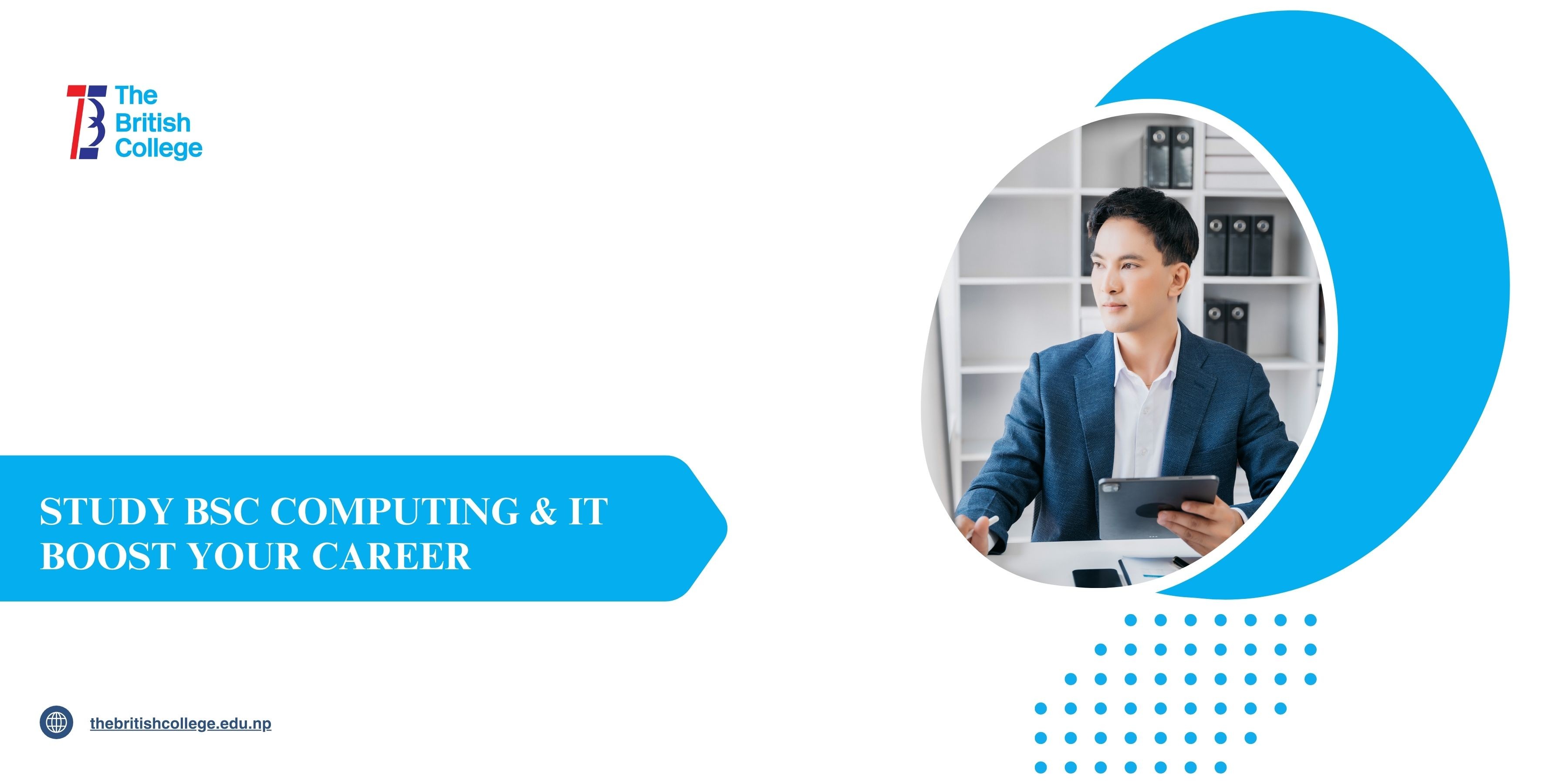
What is the difference between BSc Computing and IT and BSc Hons Computing &IT?
The main difference between the degrees lies in the depth and focus of the curriculum. With BSc Hons Computing and IT being a more technical and specialised degree, BSc Computing and IT may include more broad and general topics.
Can I switch to a different field after completing BSc Hons Computing and IT?
You can switch to a different field after you complete a BSc Honours Computing and IT degree. The skills that students gain from the degree are highly transferable and allow them to pivot to fields such as data science, cyber security and even business analysis to name a few.
What are the entry requirements for BSc Hons Computing and IT?
The entry requirements for BSc Honours Computing and IT can vary by university and country, however, you will require strong grades in mathematics and science-based subjects on your A levels with 3.5 credits or a relevant degree.
How long does it take to complete a BSc Hons Computing and IT degree?
A BSc Hons Computing and IT degree usually takes three to four years to complete, depending on the university and whether you study full-time or part-time. Some universities also include a foundational year, making the total duration of the program four years.
Is BSc Hons Computing and IT worth it?
There is a high demand for IT professionals and lucrative career opportunities are readily available. Considering this a BSc Hons Computing and IT degree is worth considering if you are a person who is passionate about technology and are eager to build a successful career in the field.


